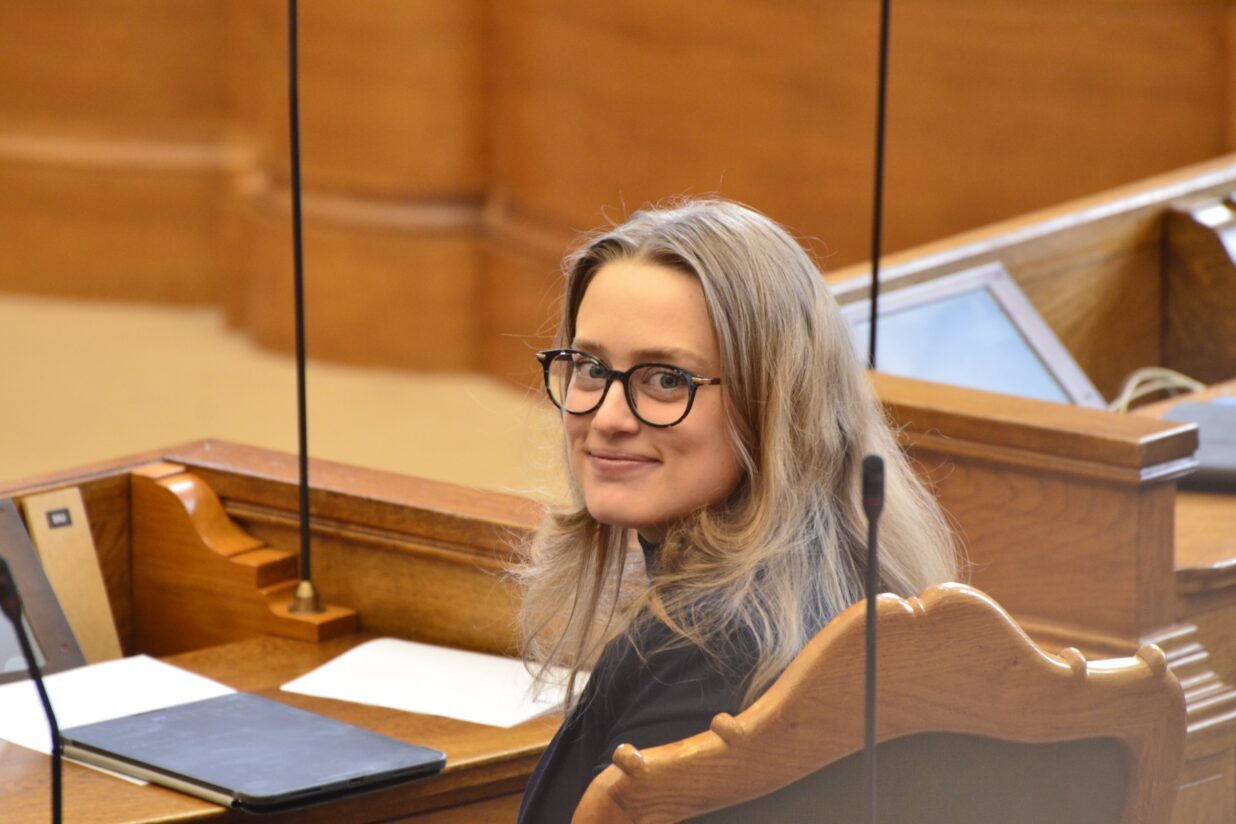17.05.2023 - 11:50
Aki-Matilda Høegh-Dam (1996, Hillerød, Denmark) is the youngest member of the Danish parliament and also the youngest elected in Greenland. The parliamentarian from the left-center party Siumut is known for her activism in support of children’s rights and indigenous peoples. She has mixed heritage, Greenlandic and Danish, but identifies herself as Greenlandic. Høegh-Dam recently went viral for a groundbreaking scene in the Danish parliament. She refused to speak Danish and expressed herself in her native Inuit language, Greenlandic, defying the chamber’s president. “People were so surprised to see me speaking Greenlandic in front of the Danes that many told me they cried when they saw my speech,” she explains in this interview with VilaWeb.
-“We are no longer afraid to speak Greenlandic,” you recently said. Can you explain?
-The relationship between Greenland and Denmark has a historical significance that cannot be overlooked. Greenland was a Danish colony until 1953. Danish colonialism was so strong that many Greenlanders were not allowed to speak Greenlandic. They instilled fear in us about speaking our language for speeches, singing, and creating music. But now Greenlanders have lost that fear. It was essential to do so and acknowledge Greenland’s cultural identity to preserve the language and our heritage. People were so surprised to see me speaking Greenlandic in front of the Danes that many told me they cried when they saw my speech. They didn’t expect anyone to dare to do such a thing.
-Has anything changed now that you have overcome the fear?
-In the past four years, a large number of historical facts that Denmark had kept secret have come to light. They all demonstrate that the Danish government attempted to commit genocide against the Greenlandic people. The oppression of Greenlanders has become a political debate. This has encouraged many Greenlanders to speak Greenlandic even more. It is crucial for our sense of belonging. Languages are much more than a means of communication; they are the very essence of our cultural identity. They shape our worldview. There has also been a recovery of our cultural heritage, such as facial tattoos and hand tattoos, which have become increasingly common.
-In your speech, you mentioned one of the most notorious atrocities of Danish colonialism, the forced sterilization of Greenlandic women in the 1960s and 1970s.
-Yes. In fact, a former Danish minister declared in the exact same place where I made my parliamentary speech that he was glad to have succeeded in reducing the Greenlandic population to save a lot of money. He appeared very proud, and it broke my heart. Many were young girls, twelve years old, who are now in their sixties. They have not had children even though they wanted to. These contraceptives were illegal in Denmark but were used on Greenlandic women. I don’t think it’s a coincidence.
-Greenlandic is still considered “vulnerable” according to the UNESCO Red Book of Endangered Languages. What is the current situation of the language?
-In Greenland, there are around 55,000 Greenlanders, and it is said that approximately 90% of the population speaks Greenlandic. In Denmark, there are about 14,000 Greenlanders, but we don’t know how many speak Greenlandic. However, it is evident that Danish still has a strong presence in Greenland. I believe we need to make a great effort to protect our language, which is an essential part of preserving our cultural heritage. We need to promote the use of Greenlandic, starting with public spaces like the parliament. That is the only way forward if we don’t want to lose our language.
-How have you managed to preserve Greenlandic despite the diglossia with Danish?
-Schools play a crucial role. We have implemented many educational programs to promote Greenlandic. Respect for the language only became a reality when Greenlanders established our own parliament. This is the only way to ensure that future generations can also embrace their linguistic heritage. It is vital that we continue to develop our language policy in schools, workplaces, and the parliament. This should be a right for all citizens worldwide.
-Well, in the Spanish Congress, deputies cannot express themselves in Catalan, Basque, or Galician because Spanish is the official language. What do you think about that?
-That is terrible, absolutely terrible. The rights of all citizens must be respected. We will never have an inclusive society if one language is valued more than another. All languages should be equally valued and celebrated. Inclusive language policies are vital for creating a more open and diverse society. If countries like Spain want to provide equal access to public services, education, and employment, they must also ensure linguistic equality.
-Continuing with the parallel, there is also an independence movement in Greenland, of which you are a part.
-We are independentists because we believe that to have true egalitarian societies, we need to create equal frameworks of action. Throughout the world, this is achieved through the formation of states. Becoming a state means being respected by countries worldwide and collaborating on an equal footing while respecting linguistic differences. Denmark continues to consider us inferior. I demonstrated that with my speech the other day. With independence, we want to ensure that our relationship with the world is based on equality.
-Could we say that Denmark still has a colonial mentality towards Greenland?
-Absolutely. Much of the structure of Denmark today is not a confederation; it is still a colonial government.
-Here, in southern Europe, we sometimes idealize the Nordic countries too much.-
Denmark is excellent at pretending to be a democratic country. We have learned that the hard way.
-If the majority of the population and parties are in favor of independence, how do you plan to achieve it?
-We have just announced our new constitution, and I believe it won’t be long before there is a Greenlandic state. Our self-government law states that the creation of a new state must first be debated in the Greenlandic parliament. We also want to have discussions with Denmark, similar to the UK and Europe during Brexit. After negotiations, the Greenlandic people will have a referendum in Greenland where we will vote to form a new state.
-But what if Denmark refuses to grant you the referendum?
-We will hold the independence referendum no matter what. And if Denmark tries to stop us, the United Nations can intervene. The UN announced in 2009 that the Greenlandic population is a distinct people, and we are protected by international law to hold a referendum. We have the right to do it, and we will.



